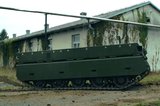US Army orders Precision Strike Missiles
PrSM launch at White Sands Missile Range. (Photo: US Army)
US Army Contracting Command has ordered 54 Precision Strike Missiles (PrSMs) from Lockheed Martin Missiles and Fire Control for $77.42 million.
Work on the contract modification for Increment 1 PrSM will be completed by 30 September 2025, the DoD revealed on 26 September.
PrSM aims to replace the deep-strike surface-to-surface MGM-140 Army Tactical Missile System (ATACMS) with a new system providing increased ranges of more than 500km.
Two PrSMs are designed to fit in each of the existing ATACMS MLRS pods on an M142 High Mobility Artillery Rocket System launcher.
The US Army has earmarked PrSM as one of its priority modernisation programmes for FY2023.
In FY2022, it accounted for $166 million of procurement funds but the US Army asked for $213 million in FY2023 as the programme gathers pace.
Current priorities include integrating a Land-Based Anti-Ship Missile seeker and extended-range propulsion ramjet, with an eye on PrSM Increment 2 flight tests in 2024-2025.
Related Programmes in Defence Insight
More from Land Warfare
-
![Estonia builds Asia-Pacific links as it looks to scale defence industry capabilities]()
Estonia builds Asia-Pacific links as it looks to scale defence industry capabilities
Collaboration between Estonian defence companies and well-aligned firms in Asia-Pacific will form a key part of Tallinn’s ambitions to significantly grow its defence industrial base.
-
![World Defense Show 2026: DOK-ING working on MV-8 variants and reveals specs ahead of Eurosatory]()
World Defense Show 2026: DOK-ING working on MV-8 variants and reveals specs ahead of Eurosatory
The Croatian company began the development of the MV-8 modular uncrewed platform in the early 2020s. Specifications for the vehicle were revealed to Shephard at World Defense Show 2026.
-
![World Defense Show 2026: Turkish and European industries will cooperate, says Aselsan boss]()
World Defense Show 2026: Turkish and European industries will cooperate, says Aselsan boss
Aselsan was formed 50 years ago in response to difficulties Turkey was facing in sourcing major systems internationally. While some challenges still remain, company president Ahmet Akyol believes a rapprochement is possible.
-
![World Defense Show 2026: MARSS displays new Nation Shield air defence C2 system]()
World Defense Show 2026: MARSS displays new Nation Shield air defence C2 system
Nation Shield is the latest iteration of the MARSS C2 system and is designed to provide C2 further forward along with more capable air defence.
-
![World Defense Show 2026: Middle East remains focused on US equipment and local industry involvement]()
World Defense Show 2026: Middle East remains focused on US equipment and local industry involvement
Vehicle procurement in the Middle East continues to target big-ticket main battle tanks, with lighter platform purchases also potentially on the horizon including tactical, infantry fighting and armoured personnel carrier vehicles.





















